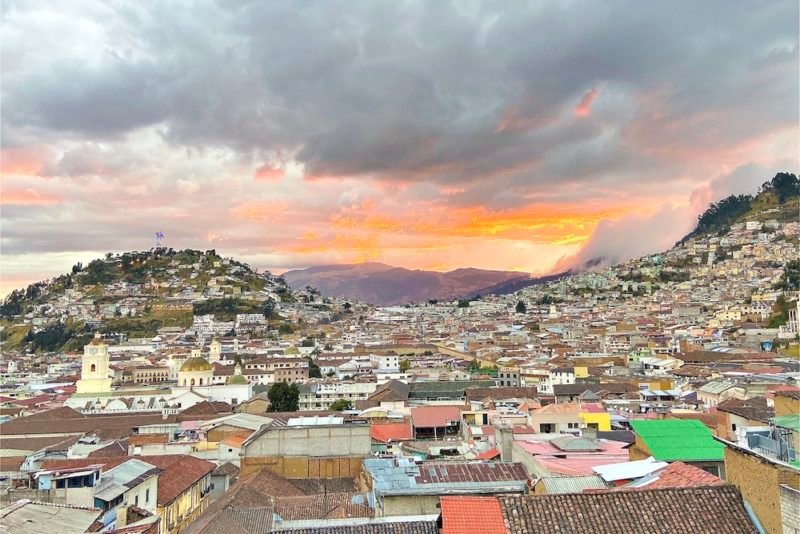
This is Part 1 of a two-part post. Part 1 is about what we lost (a fun vacation). Part 2 is about what I gained (life lessons and insights).
This will not be a normal travel post, because my trip was not a normal trip. Way back in April, my husband and I booked a trip to Ecuador, planning to spend five nights in the capital city, Quito, before flying south to Cuenca, a smaller city, where we would be joined by two friends from the U.S.
Three days before we were supposed to leave, civil unrest broke out in Ecuador. Protesters were blocking access to Quito’s airport, so virtually all flights were canceled. A few days later, after much hand-wringing, the military got the road open, flights resumed, and it appeared the worst was over. We decided to carry on as planned. After all, we had an amazing trip to Istanbul in December 2016, mere months after a suicide bomb and gun attack at the airport, and mere weeks after a suicide and car bombing outside an arena.
In this case, however, the worst was not over.
Building up to a strike
When we checked into our gorgeous Airbnb on Monday, October 7, the doorman pointed to the historic center—a mere handful of blocks away—from our balcony and told us not to go down there, and to be very careful going out. We did go out, only to find many business and restaurants shuttered. We picked up some milk and avocados from a small tienda, ate avocado-and-egg toast for dinner and went to bed early.
On Tuesday, we made a fresh start, and took an Uber to the La Floresta neighborhood. Around 10 a.m., our host texted us to ask if we were OK. She said we should make sure to be back inside by 4 p.m., because the protests would be getting worse. We grabbed some lunch (delicious empanadas!), drank some delicious coffee, bought some amazing chocolate and went to the SuperMaxi to find the meat department almost bare, and the produce department picked over. Let me set the scene: it was 1 p.m. on a Tuesday, and the store was packed and shopping carts were filled to the brim. People were stocking up, and for good reason—a national strike was planned for the next day. We bought enough food (and beer) to last us until at least Thursday, and were lucky to make it home in an Uber, as streets were already being blocked off.
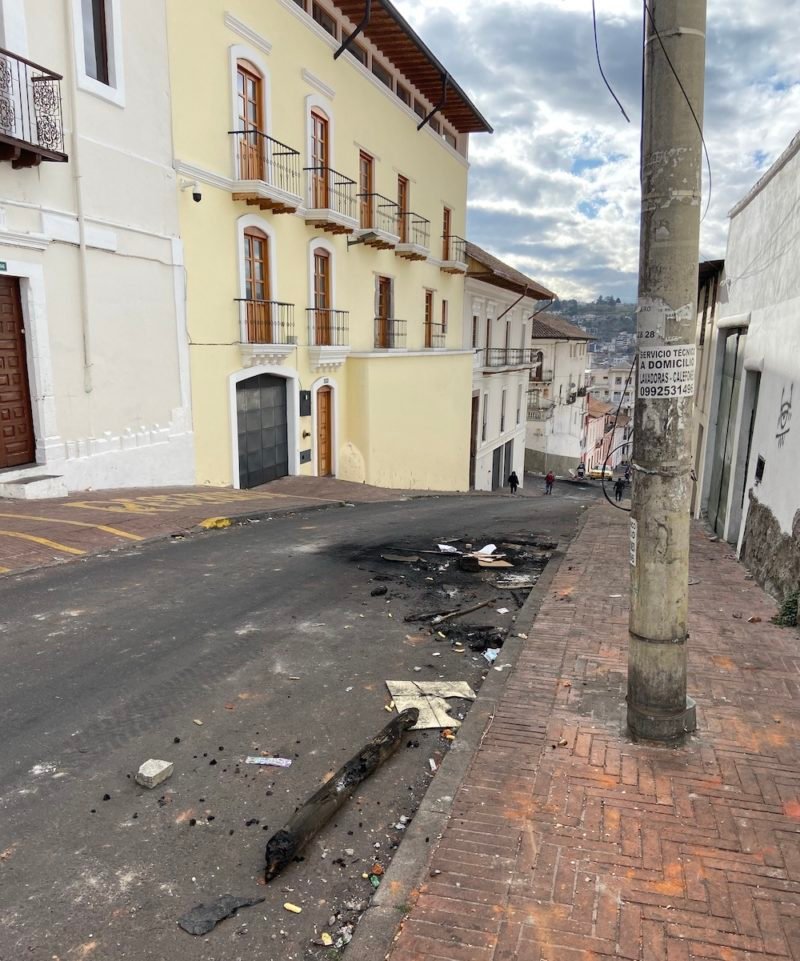
“House arrest”
We resigned our self to “house arrest” on Wednesday, and boy, did things get wild. We had to leave our lovely patio doors closed because protestors were throwing tear gas and burning tires on our street. Somewhat alarming, to be sure, but we felt safe in our apartment.
Thursday morning, things were quiet (as had been the case to that point), so we got up early and walked down to the historic center. The architecture was lovely, but the streets were a mess (remnants of burned tires and debris, brick and cobblestones pried up to be used as weapons). However, cleanup was in progress, which seemed encouraging.
We Uber’d to the Las Mariscal neighborhood, and had a lovely Ecuadorian lunch, but had an even more difficult time getting back to our apartment after lunch than we had on Tuesday…one Uber driver refused to take us to our neighborhood and told us to get out of his car. Fortunately, the next driver was more fearless.
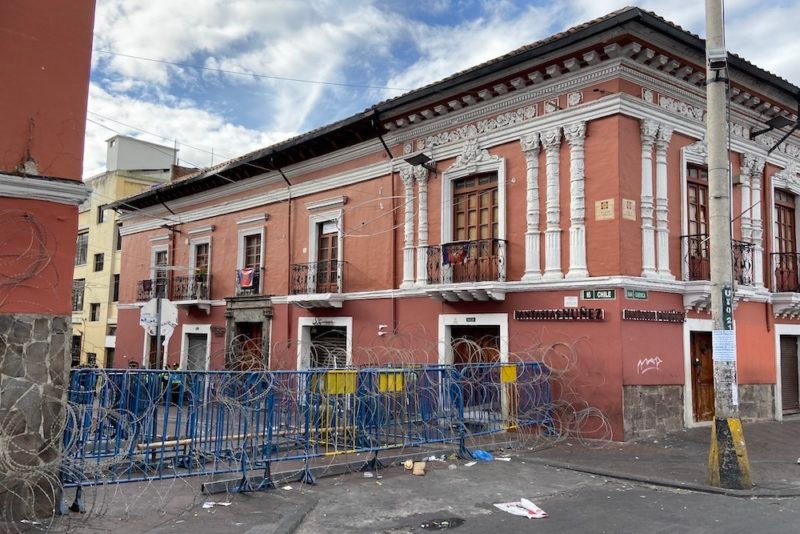
The escalation
Friday started out uneventfully. While I worked on some writing assignments, my husband decided to walk through the historic center to climb the hill known as el Panecillo to the Virgin of Quito statute. He said that while the police/military had several blocks barricaded around the government buildings, things were relatively quiet in the historic center—although that was not the case to the west, in the area our Uber driver almost got trapped in the day before.
We thought things would be better starting the next day, when we went to Cuenca, where the protests had largely been more peaceful (although they were relying on airlifted food and were in danger of running out of propane for cooking and water heating). However, Cuenca was not to be.
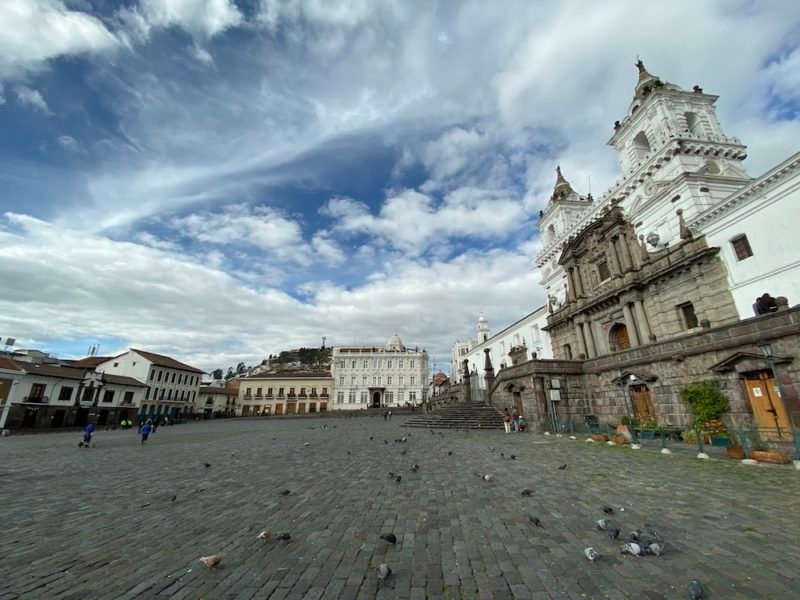
Trapped in Quito
Our Airbnb host had arranged for a driver to pick us up at noon for our mid-afternoon flight. Around 10 a.m., she texted us, worried. The driver was stuck in protest blockades, and she urged us to try to get an Uber or a cab immediately. Well, the few Uber drivers who tried to get to us couldn’t, and it was just as well, as the roads to the airport were blocked. The major highway, the Ruta Viva (Live Route), was a minefield of burning tires and other debris—I saw video of protestors throwing burning branches off of overpasses. (Note: these particular protesters were NOT the indigenous Ecuadorians who were at the heart of the protest, but more violent factions, as we sadly see even with protests in the U.S.)
We consulted with our friends who were to join us in Cuenca, and we decided to call it off. Our Airbnb was vacant after us due to a cancelation (shocking, I know) and our host said we could stay for free until it was safe to leave. Those were odd days, as we felt perfectly safe in our, again, lovely apartment, but constrained by not being to go out safely (besides, everything was closed). And those days were a blur of constant checking of news on Ecuadorian expat Facebook groups, supplemented with texts from our hosts, who had some excellent and reliable sources of information. The uncertainty of how or when we would be able to leave was a head-wrecker, and we vacillated between optimism and something resembling despair.
Saturday night, we were trying to take our mind off things by watching a movie, when we heard banging. My first thought was that the protestors were marching down our street, but when we went out on the balcony we realized it was more than that.

Sweet, sweet freedom
Sunday, we took a chance and booked a flight out of the Quito airport for Monday afternoon (almost every single flight Sunday to and from Quito was canceled). That afternoon, UN negotiators mediated a meeting between indigenous leaders and the Ecuadorian president. I watched the livestream of the proceedings, hopeful.

Later that evening, as I was taking a shower and trying to calm my worried mind, my husband came in and told me our host had texted—the government made concessions, the protests were over, and the Ruta Viva would be cleared immediately. We could go home!

We met our host before we departed, and there were hugs all around. She had truly been worried for us, but ironically she was the one who had been in true danger. She lives on a cul-de-sac, and one night over the weekend, protesters had inexplicably blocked her street (I say inexplicable, because it’s not a through street). Her husband was away and unable to return due to the flight cancellations. (When he asked her how her visitors—that would be us—were doing, and she told him we were visiting other neighborhoods, he asked her “Who ARE these people?”) She slept in her living room, afraid that protesters would try to enter the house, determined to protect her daughter.
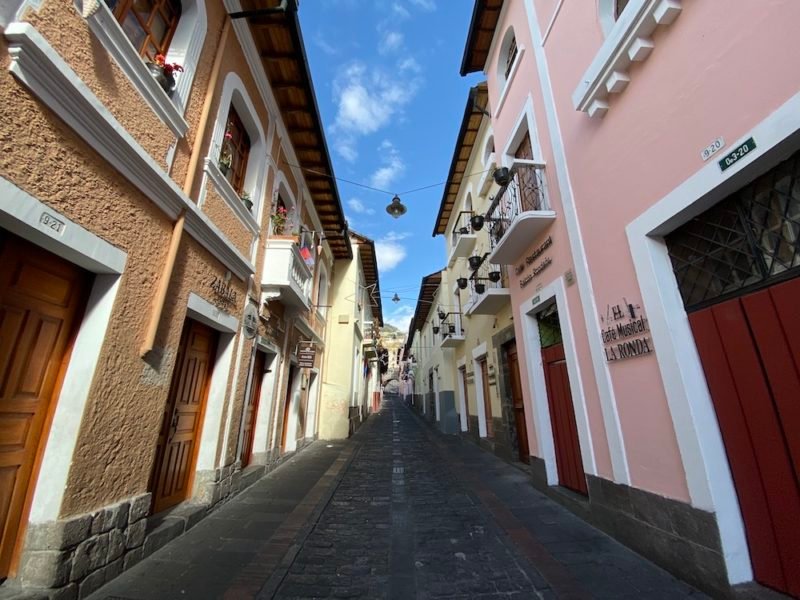
Lessons learned
In hindsight (with it’s 20-20 vision), we should have canceled our trip before we even departed. But that was not the decision we made, and given that, I was somewhat surprised that there were at most one or two flickering moments when I thought “I wish we had never come here.” (There were, however, a few lengthy moments over the weekend where I tearfully said, “I just want to go home!)
The fact is that one of the reasons I value and enjoy traveling is to see other places, other peoples, whether that’s in other parts of the country or other parts of the world. I like seeing how people live, and observing the ways it’s similar, and the ways it’s different to how I live. I generally come away with some new ideas to incorporate into my own life, as well as a sense of gratitude for what I already have (yes, even after coming home from Paris). In no way am I now an expert on what happened these past few weeks in Ecuador, or the history that lead up to it, but I know more than I did before, and not only did I witness an important period in Ecuador’s history, but I think I have a deeper respect for the country’s people than I would have if things had been “normal.” In hindsight, that’s worth a few days of angst. I look forward to returning to Ecuador in a calmer time—and this time I’ll make it to Cuenca!
Disclaimer: All information provided here is of a general nature and is furnished only for educational purposes. This information is not to be taken as medical or other health advice pertaining to an individual’s specific health or medical condition. You agree that the use of this information is at your own risk.
Hi, I’m Carrie Dennett, MPH, RDN, a weight-inclusive registered dietitian, nutrition therapist and body image counselor. I offer compassionate, individualized care for adults of all ages, shapes, sizes and genders who want to break free from eating disorders, disordered eating or chronic dieting. If you need to learn how to manage IBS symptoms with food, or improve your nutrition and lifestyle habits to help manage a current health concern or simply support your overall health and well-being, I help people with that, too.
Need 1-on-1 help for your nutrition, eating, or body image concerns? Schedule a free 20-minute Discovery Call to talk about how I can help you and explore if we’re a good fit! I’m in-network with Regence BCBS, FirstChoice Health and Providence Health Plan, and can bill Blue Cross and/or Blue Shield insurances in many states. If I don’t take your insurance, I can help you seek reimbursement on your own. To learn more, explore my insurance and services areas page.
 Print This Post
Print This Post






